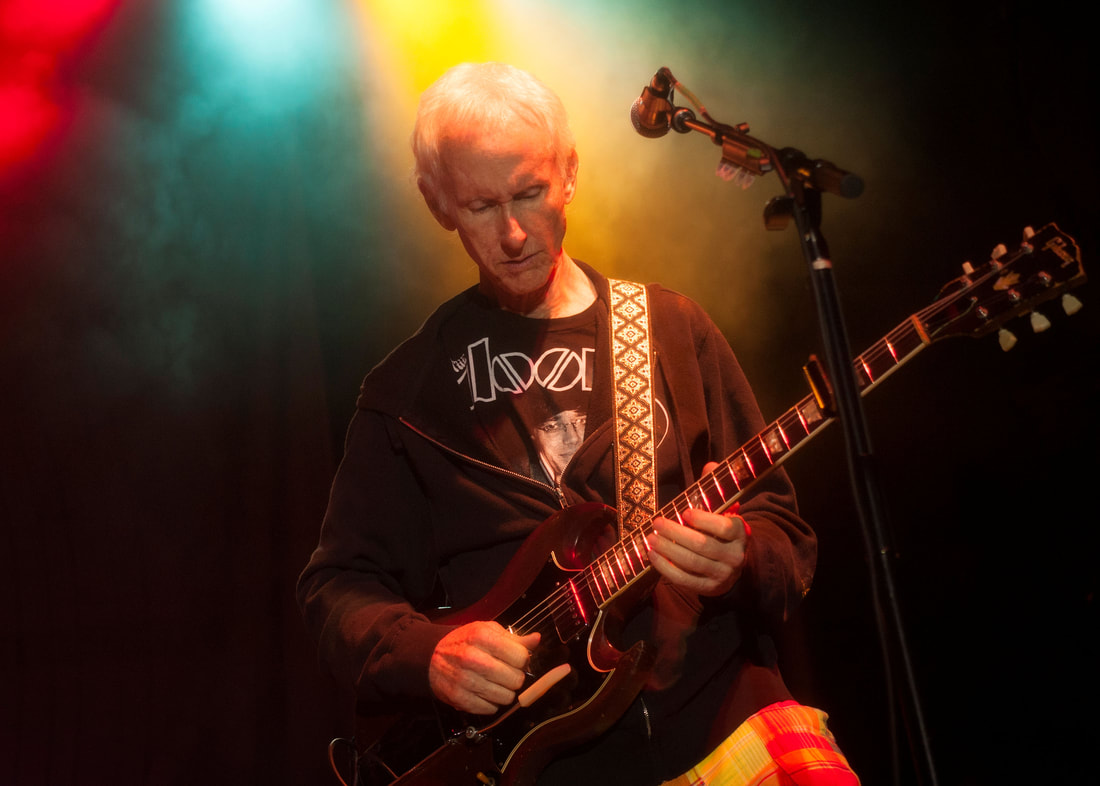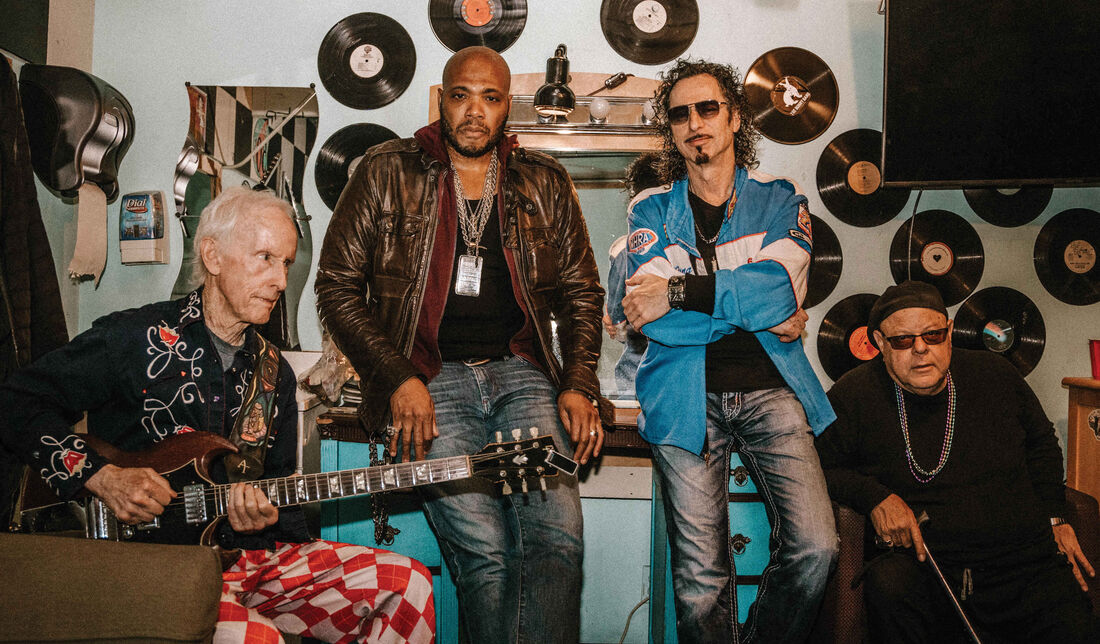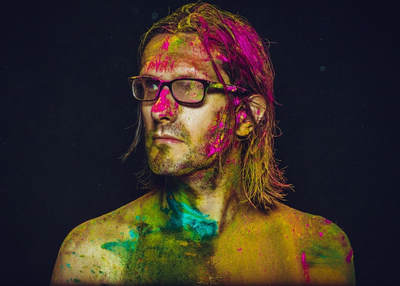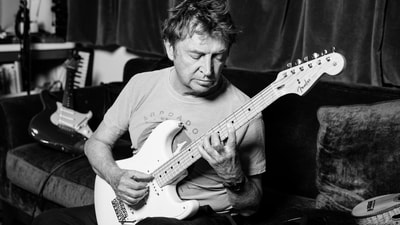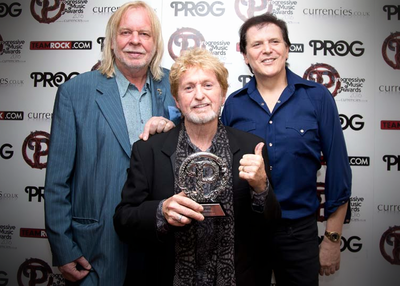|
Robby Krieger needs little introduction. As a member of The Doors he co-wrote the majority of the band's material with Jim Morrison, producing a catalogue of songs that are as revered today as any of the great masterworks. From 'Light my Fire' to 'The End', his work is almost unparalleled in its cultural significance and influence, while his guitar style is utterly unmistakable. Back with a new album with his Soul Savages, we sat down with Robby and keys man and collaborator Ed Roth for a chat about the new album, as well as some Doors' history. Rider on the storm; Eamon O'Neill.
Let's start off talking about the name; 'Robby Krieger and the Soul Savages'; where did that come from?
Robby: Well, we were trying to think of a name and God, we must have had about 100 different names, and, you know, I didn't really like 'The Soul Savages' that much, but the other guys did, and they're The Soul Savages. So I'm Robby Krieger. It worked out good. I have to say, I love the album. Ed: Yeah, we spent some time on it. I've done a bunch of instrumental stuff in the past and so as Robby, but our paths hadn't crossed until I started playing with his his Doors band [Robby Krieger & Friends]. I mean, it's not really 'The Doors'; he's The Door, though we did a few shows with John [Densmore, Doors drummer]. Yeah, it's a great record. I mean, you get the right guys together and you take time on writing melodies and making them about songs. I think you can have a really great record instead of just a bunch of guys whittling away and soloing. The music is very well constructed, so how did you avoid the jam band feel? Robby: Yeah, a lot of it was live. We did some overdubs here and there, as well, but yeah, I mean, the good thing about these songs, I think, is that they're not just meandering, you know? Each instrument, either the guitar or the or the keyboard, or both, are really the voice in the songs. Because they're all instrumentals, there is no voice, but we try to make it a voice. I think a lot of these songs could have vocals, but we wanted to do an instrumental thing, and I think it came out pretty good. You don't want the curse of the jam band because sometimes those solos can go nowhere. Ed: Yeah, that's really a thing because your solos have to build, they have to say something, the band has to come down dynamically, they have to know how to come up, and when you try to do it on a record you've got to try to tell a story in a sixteen bar solo or a thirty-two bar solo. It's a different thing, Especially with instrumentals, right? When you create titles for instrumentals, it has to be relevant, doesn't it? Ed: Well, yeah, I mean, the melodies have got to sing. There's no vocalist, so you'd better sing with your instrument. Robby, with your own history, obviously you cannot get away from the Doors, and those Hammond organs on some tracks make it very reminiscent of your work with Ray Manzarek. Robby: Well, actually, Ray only played the Hammond on very, very few songs, maybe two or three there. Most of it was that Vox organ horrible sounding box. I wish he had used a Hammond more. What do you think, Ed? Ed: Yeah, I mean, they're very different instruments. Ray is one of the only guys who could make that thing sound good. Somehow it sounds amazing when he plays it. It's a hard one to be expressive with because you don't have a Lesley [speaker], and the draw bars are very limited. I don't know, it's a different kind of thing. I started on a combo organ, because that was all I could afford, and I needed it. Like I said, when Ray played it, it sounds amazing, and it totally suited songs and works. You know, he was a brilliant, brilliant cat. I love the back and forth and how you trade solos. I think it's very effective for this album. Robby: Well thank you. Yeah, I think Ed and I are pretty good at that, going back and forth. And that's a lot! It makes it really fun, and Ed plays in my Doors band as well, and we we've added quite a few back and forth things into some of the Doors songs, and it's been pretty fun. A song like say, 'Light My Fire' has such a unique guitar solo; did that come from your flamenco background?
Robby: Yeah, I would say so. I mean, you know, I also was really into Indian music a lot, and if you listen to the solo on 'Light My Fire' it really is comes more from a Ravi Shankar kind of vibe, as well as 'The End'; it has that Indian music. A couple of the songs, especially 'Samosas & Kingfishers' on this album, come from that same Ravi Shankar kind of field. You studied under Ravi Shankar, didn't you? Robby: I did. I went to his school. He only showed up once or twice, but it was called the Kinnara School [of Music]. It was in Hollywood, and Ravi showed up once or twice, but mostly it was this other guy who was a great sitar player. John Densmore and I both went to that school. It was a lot of fun. Is that sitar you're playing on the song, or is it a guitar effect? Robby: Well, actually, it shows me playing the sitar on the video, but I'm not really playing it. It's really an electric guitar that I play on the track, so I'm just faking it with that big old sitar! One of the things I love about the album is it clearly has your imprint all over it. Are you still using the same Gibson SG from right back to the early days? Robby: Well, my original one got stolen, but yeah, the one I have now is a 1967, which is very similar to the one that I had with The Doors. On the first two Doors albums it was a Melody Maker, actually, which is kind of like a cheap SG, but, yeah, this one I have now I've had it for maybe thirty years. It's a 1967 SG. Pretty nice guitar. There's a track on the album called 'Kilizoni', and drummer Franklin Vanderbilt is really hammering away on that ride cymbal. Ed: Well, that's a real unique beat that Franklin is playing. I mean, it's as unique as it comes, and it took me to a particular place. It's great when you play with guys that play things that inspire you to go to a specific place. I don't know, that crazy fusion melody that I came up with, I think somehow those drums took me to that place. And you know, Robby's slide on it, it's probably influenced by what we're playing. In some of the fills he's playing it's like; I'm playing outside, he's playing outside too, but slightly in a different way. And, you know, you're talking about playing off each other; it's so important that. Music is just sound if people don't listen to each other when they're playing. If somebody's not listening, I don't want to play music with them, and Robby and Franklin and Kevin {Brandon, bass] they listened so much, and their spirit will respond to what they hear. Franklin's drum groove, yeah, a lot of it came out of that, and then Kevin heard the diminished scale that I was doing, and he came up with just a devastating bass line; it's just crashing! Again, what keeps it from being a stock fusion tune is where Robby went with it. He's gone to a whole different place. I think we don't sound like us. Robby, you play some lush slides on 'A Day and L.A.', but also, what I'd call 'unfussy' leads; how do you decide whether you're going to play a slide or not? Robby: Well, if I can get away with a slide, I'll put it in there. I love playing slide, especially with tunes like these that are not just regular blues tunes. I get tired of playing slide just on the blues like everybody else, but if if I can get away with it, I will stick it in in some pretty weird places. To my ears, this album is a pop jazz album. Would you call it that?
Robby: 'Pop Jazz'? That's pretty good. Yeah, I like that! What do you think Ed? Ed: Yeah, I mean, I would say 'soul jazz', maybe. I don't know, it's so hard to put a label on it. But we have melodies, we try to make our instruments sing and play things that people can feel and remember. Another track that I love is the opener 'Shark Skin Suit'; it's a great title, and it really sets the tone for the album. Robby: Yeah, I would hope so. You know, our manager, Tom Vitorino he was saying; "you guys don't have enough up tempo stuff", so we said; "okay, let's do it! Let's do something really up and fast", and we came up with this 'Shark Skin Suit' thing. Yeah, it's one of my favourites. Robby, obviously you're a Rock and Roll Hall of Famer, and as a member of the Doors, you've accomplished pretty much everything, but it's obviously important for you to still be creating music. Robby: Exactly. I mean, that's what keeps me going really. It's fun just to keep doing new stuff and playing with different people. We got together during the pandemic and it really worked out to be a good thing. You mentioned your Doors band; you obviously still have a lot of pride for your past and keeping those songs alive. Robby: Yeah. I mean, you know, for me, it's just I'm lucky that the Doors songs are so much fun to play. You know, everybody loves to playing them, and I do too. It's not something where I go; "oh, God, I've got to play 'Light My Fire' again"; I look forward to playing the songs all the time. I love the guitar on 'Love Me Two Times'; that riff with the little tail; where does that come from? Robby: Where I got that idea from, that is pretty funny. It reminds me of a lizard's tongue, you know? Ed, what's it like for you to be playing those songs? Clearly you're a fan, first and foremost.
Ed: Well, yeah, I mean, you're talking about songs that are at a different depth, as far as what's in them. They still have feel, they have jazz influence, they have rock influence, I hear Indian influences; I'm still trying to get him to show me what he's playing on guitar on 'The End', slowly. It's special music, and I'm playing it with the guy that wrote the majority of the material with Jim, and and the material that I personally am closer to. It's a blast! And trying to be Ray? Ray was just a iconic player, he really was a special player, I'm glad you mentioned 'The End' because Robby, those licks at the start and end are just so unusual. Robby: Yeah, that was from Ravi Shankar, listening to him, and I tuned my guitar a little differently on that song that the E strings are tuned down to D. So the top string and the bottom string are down a whole step, and that makes is sound so different. When I play that D chord, it sounds different because of that, so that's kind of where that came from. When I think of The Doors, you're one of those bands like Led Zeppelin or The Who were every person made a significant contribution. It couldn't have been anyone else. Robby: You're right. You're right. Yeah, it's just luck, I guess that the four of us happened to come together and be at the right place at the right time. I have to thank John Densmore for that because he brought me in. They had a couple of other guitar players before me, and I ended up being the one. Robby, you're one of only two left from the group; do you miss Jim Morrison and Ray Manzarek? Robby: Of course, I miss them. You know, after Jim passed, it was just the three of us and we did a couple albums as The Doors after that, and there's actually some pretty good stuff on those albums. But after that, I started just doing my own thing; solo albums and stuff. Then in year 2000, Ray and I got back together and started playing The Doors stuff again. We had Ian Astbury [The Cult] and there was a couple other guys too that were pretty good singers. There was a guy named Miljenko Matijevic, who has a great voice and that was really fun. We got to go all around the world which we never did on The Door - we did one European tour that was it - but with Ray we went to Russia, we went to Australia, all over the place. Did you ever get to visit Jim's grave in Paris? Robby: Oh, yeah, I've been there many times; been probably five or six times, yeah. Bringing it back to what you're currently doing, and have you any live shows planned? Robby: I hope so. We're looking for some stuff now, and we're hoping when the album comes out that that'll come together. We've been actually playing together for the last two years live, so we've got our shit together, as far as that's concerned. What are you hoping for with this release? Robby: Well, I've had five or six, seven solo albums I've done and none of them really did that much. People really don't care about me playing anything but The Doors, so I'm hoping this will be different, because it is. I think it is a lot more commercial than my other albums. I could see some of these songs being on movies or TV or stuff like that. Is that is that a frustration for you that people want to just talk about The Doors material? Robby: Yeah, it's a little difficult, but it's a good problem to have. Like this interview? Like us on Facebook and follow us on Twitter for regular updates & more of the same. Robby Krieger and the Soul Savages is out now. Click here to order. |
|
RobbY Krieger.
"The four of us happened to come together and be at the right place at the right time."
© 2016 - 2024 eonmusic.co.ukContact: [email protected]
|

